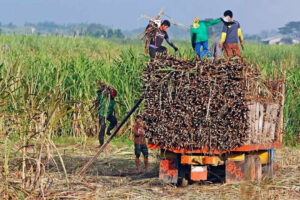Domestic sugar allocation seen improving prices for producers
SUGAR FARMERS said the designation of the entire sugar harvest for the domestic market will fetch better prices for producers. “(This) traditionally brings a more favorable price for producers, compared to other classifications of sugar,” National Federation of Sugarcane Planters President Enrique D. Rojas said in a statement on Wednesday. The Sugar Regulatory Administration had […]

SUGAR FARMERS said the designation of the entire sugar harvest for the domestic market will fetch better prices for producers.
“(This) traditionally brings a more favorable price for producers, compared to other classifications of sugar,” National Federation of Sugarcane Planters President Enrique D. Rojas said in a statement on Wednesday.
The Sugar Regulatory Administration had earlier approved the classification of all sugar production for the 2024-2025 crop year as “B” sugar or for domestic use, according to Sugar Order No.1.
The regulator typically classifies domestic sugar production during the start of every crop year, based on the expected volume.
Sugar is classified as “A” for export to the United States, “B” for the domestic market, “C” for reserve sugar to be converted later into other classes, and “D” for export to the world market.
The SRA estimated a 7% drop in sugar production to 1.78 million metric tons (MMT) due to crop damage sustained during El Niño.
The government weather service, known as PAGASA (Philippine Atmospheric, Geophysical and Astronomical Services Administration), declared the onset of El Niño in June last year, bringing below-normal rainfall conditions, dry spells and droughts. It ended in June 2024.
“With the expected shortfall of domestic sugar production versus the estimated domestic demand, it is a good move on the part of the (SRA) to designated sugar production as ‘B’ sugar for the domestic market,” Mr. Rojas added.
Sugarcane production dropped 42.3% year on year to 1.63 MMT during the second quarter, the Philippine Statistics Authority said.
“We are hoping that the weather for the rest of the crop year is favorable to give us an opportunity to recover the projected production shortfall,” he said.
PAGASA forecasts a 55% probability of La Niña occurring between October and December. — Adrian H. Halili























